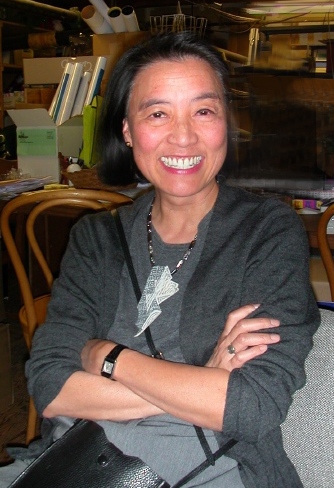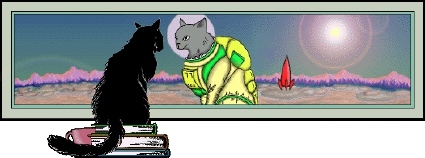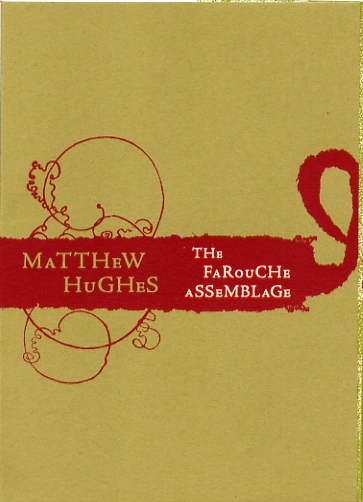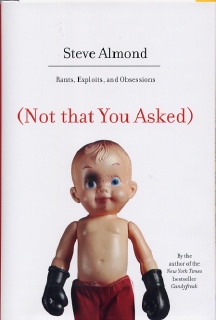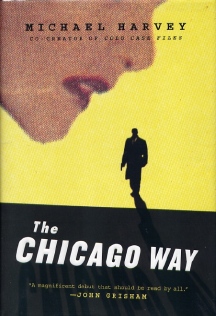|
|
|
|
This Just In...News
From The Agony Column
|
| |
|
10-12-07: Joyelle McSweeney 'Flet' From Fence ; Agony Column
Podcast News : A Conversation With Gail Tsukiyama
|
Poetry to/as Science Fiction
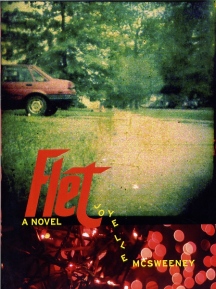 |
|
| Striking
design sells another book. |
|
Sometimes you pick up a book and whole damn world opens up at your feet.
Such was the case for me with 'Flet' (Fence Books ; December 2007 ; $15)
by Joyelle McSweeney, which I found sitting in a pile of books at KUSP.
Here's this tiny, tiny book with a really striking design. At first my
thought is that it must be a book of poetry, it's so small. Of course
the last name grabs me, and I'm at first thinking this is another McSweeney's
gig, but that's not the case. By the time I see that it's a novel, it's
already in my hands. I open up the book, start to read, flip around start
to check out the publisher, Fence Books, and I'm off down the rabbit-hole.
Let's start with 'Flet', who is the heroine of this very strange combination
of poetry, prose and polemic. Flet lives in a future which is more of a
bad-dream version of the present than an evocation of the day after tomorrow.
Remember the recent non-fiction book 'The Long Emergency' by James Howard
Kunstler, in which he talked about how our country would soon be plunged
into a never-ending "emergency" which would see services, rights
and every other damn thing we treasure dwindle slowly away? Well, that's
the starting point for 'Flet', who is an Administration flunky. She follows
Secretary Otis (a woman) around makes sure things work as best they can.
That's not so hot, and Flet is a natural born trouble-maker with a sense
of curiosity that is bound to get her in trouble. Heading towards the ominously-named "Reenactment",
time is running low even as most of the citizens of "Nation" sequester
themselves away and annihilate all rational thought by watching endless
Filetape transmissions.
In other words, we've got another work of non-fiction masquerading as a
literary science fiction novel.
McSweeney is in fact poet, and it impacts her writing style in 'Flet',
which is written in short, poetic prose blackout chapters. It's surreal
and familiar. Just reading it may make you feel like you are in one of
those dreams where the real world is re-arranged so as to be uncomfortably
unfamiliar. McSweeney's vision is all about vision, not technology. I suppose
that we should get out the Irony Energy Collection Jar at this point, because
if we can indeed collect all the Ironic Energy emanating from the new crop
of good science fiction novels about our lives in a bad science fiction
novel, then heck, no more coal, right? I know, that would screw up the
present and make it more idyllic, and these science fiction novelists would
have to find honest work, like writing ad copy for gee-gaw websites. Of
course, they'd certainly view that as a form of hell as well, still consider
themselves to be living in a bad science fiction and write more good science
fiction, so I suppose it's a win-win.
Joyce McSweeney's 'Flet' doesn't just open up that bad-world / good-sf
dichotomy. It also takes you right on over to Fence
Publications, which
is likely to be well worth your valuable time, assuming that surreal, combative,
anti-commercial poetry and fiction doesn't give you hives. So long as you’re
off that allergic map, there's a lot to like about Fence. Here's
a link to the magazine, which encourages submissions, or at least puts a "Submissions" link
right up there were you can click on it. Scary! What kind of madmen and
women are running this gig? Well, the sort who would publish some pretty
damn radical poetry and prose, that's who.
Now, all this is something of an acquired taste. Or rather, you probably
already know if you’re going to love this stuff or hate it, and the
chances of your feelings falling somewhere between those two poles are
vanishingly small. So, if you love this, you now have the link, you can
buy out their entire catalogue and the whole damn stack probably wouldn’t
even get halfway to the top of a single month's releases from Major New
York publishing house. That's a good thing. How can you resist 'The Cow'
by Ariana Reines with a blurb that screams "I COULD BE A DIAPER FOR
THE DAY'S RESIDUALS." Or 'A Magic Book' by Sasha Steenson? As science
fiction makes it's way into the world of poetry, or perhaps as poets wander
into the realms of science fiction, or more precisely, as more and more
poets internalize the bad science fiction novel that is Our Modern World,
we're going to be getting a lot more, er diapers. Again, I ask, how can
you resist them?
Well you can't and you shouldn’t unless even the concept of such
work makes your head go tick-tock, I'm about to blow up. But the world
clearly needs as much anti-commercial fiction and poetry and, what Fence
seems to be up to, stuff that otherwise might not ever get a chance to
exist because it lies outside of all categories, even non-commercial. Look,
give 'Flet' a try. It's like a bad dream you can put a bookmark in.
|
Agony Column Podcast News : A Conversation With Gail Tsukiyama
: On 'The Street of a Thousand Blossoms'
|
|
This
woman should be on national TV on the Show That Cannot be Named.
|
I can't believe my good
fortune sometimes. Here in Northern California, we seem to have an endless
supply of great writers who drop by our local
bookshops. Almost on a whim, I went to speak with Gail Tsukiyama, an incredibly
wonderful writer whose latest novel is 'The Street of a Thousand Blossoms'.
I can guarantee that anyone who hears this interview is going to want to
read the novel. Tsukiyama is so lively, so intelligent, and so much fun
to speak to that I really, really wished I had someone there to film her.
This interview was one of those great gifts that come one's way, and my
gift to listeners and readers is the MP3
file. Yes, it is one of those
gifts that make you go out an buy something, in this case, a beautifully
written saga chock full of lives that will stay with like the memories
of old friends. I don’t care where or how your literary taste runs,
Tsukiyama has literary charisma to spare.
|
| |
|
10-11-07: Andrew Kimbrell and 'Your Right to Know' ; Agony Column Podcast News : A Conversation with Dave Nee
from The Other Change of Hobbit : "Us old farts know a bit more about
what the history of the field has been"
|
You're the Guinea Pig
|
|
Not
in the Constitution – yet.
|
In the ever-escalating tide of evidence that we are indeed living in
a particularly bad science fiction novel, Andrew Kimbrell's 'Your
Right to Know: Genetic Engineering and the Secret Changes in Your Food'
(Earth
Aware Editions ; March 19, 2007 ; $49.95 [HC Deluxe with DVD] $24.95
PB) is a nice high-water mark. Andrew Kimbrell is the executive director
and founder of the Center for
Food Safety and the International
Center for Technology Assessment, titles that themselves seem to have been bred
in some hothouse "sci-fi" writer's brain. Alas, this is not
fiction, and the sorry state of affairs that is today's "hands-off" approach
to regulating genetically engineered life forms seems to be likely to
be the father of much of tomorrow's horror fiction. You need look no
further than Scott Sigler for the first wave.
The "lab animals" quote comes from no less august a personage
than Jane Goodall, and the evidence in this book is pretty straightforward
and fairly alarming. The bottom line is that in the US, the FDA has taken
a hands-off approach when it comes to regulating GE foodstuffs. Of course,
this is the result of heavy-duty pressure from the seemingly all-powerful
agri-business lobby, buts don’t expect that to last. You see, right
now, the technology required to do gene splicing in any scale is significant.
But when every Tom, Dick and Harry can grab their own Joy of Gene Splicing
Genetic Cookbook and whip up their own version of the fish-gene tomato,
you can be that things will get regulated pretty quickly, at least at a
local level.
Back to reality. 'Your Right to Know' is a big honkin' pitcher book, divided
into five sections that are easily read and loaded with sidebar and extraneous
data for the wary shopper. The first chapter talks about scientific studies
that suggest we'd be well-advised to test the heck out of GE foods and
organisms before we let them out of the lab, into the fields and from there,
onto our shelves and eventually into ourselves. Health risks like allergic
reactions, antibiotic resistance and reduced immune efficiency are discussed.
Chapter 2 discusses the "super weed" phenomenon and the risks
attendant to the environment, including some great stuff about the "DNA
ecosystem" that will have this generation's Mary Shelley's running
to their notebook (computers). Chapter 3 talks about the economic impacts,
which are serious and varied. Not surprisingly, the tend to favor the big
corporations at the expense of the smaller farmers and most especially
the consumers. Chapter 4 is a supermarket guide, a sort of generalist approach
that eschews the list o' foods technique, and Chapter 5 looks at alternative
eating strategies. There's even a handy pullout pocket guide tucked in
the back of the book that you can bring to grocery store with you because
there's no way to want to haul this book around. My only quibble is that
the format, while attractive, is somewhat unwieldy to read. But the bottom
line is that the information is easily extracted and the four-color spread
style ensures your attention does not wander – as does the condensed
prose, which delivers what you want and nothing more.
One of the most shocking aspects of this whole slow-mo catastrophe is the
total breakdown of the FDA. Apparently, we've been putting the foxes in
charge of the henhouse for some time now, which might be OK if you’re
a fox, but in this equation, most of us are hens, or rather, guinea pigs.
We really are the subjects of a huge experiment and the temptation is to
think and say that it's already too late. It is true that there are lots
of products on our shelves with GE content and lots of crops growing and
cross-pollinating in the big wide world. But if we can at least think about
putting on the brakes or even, at this point admitting that brakes exist,
we may at least cull the edge of the knives swinging towards our necks.
'Your Right to Know' is not a right that you'll find in the Constitution
of the United States of America. It's one you'll have to exercise yourself,
make an effort to take it back. Kimbrell writes one hell of a science fiction
novel here. It's got meta-fiction all over it, and looks like those Langford
deals about the future. But alas, it is not fiction, science fiction or
even horror, though horror might be the primary emotion experienced by
those of us who read it. Horror at what we have not done – enforce
the testing and regulation of GE organisms. Horror at what we have become,
and what we might yet become. Unless we understand and exercise our right
to know.
|
Agony Column Podcast News : A Conversation with Dave Nee
from The Other Change of Hobbit : "Us old farts know a bit more about
what the history of the field has been"
Today's Agony Column Podcast is an interview with Dave Nee, the proprietor
of The Other Change of Hobbit in Berkeley, California. As listeners may
have noticed, these bookstore owner interviews always catch me by surprise,
and I like that. Dave's no exception, and I'm sorry to report that he has
some 1500 titles in ABE books. I saw some
covers on his website that were depressingly enticing. Listen
to the MP3 before you get your credit card
ready. He just sold, well -- I'll let him tell you. All I can say is damn
and double damn!
|
| |
|
10-10-07: Matthew Hughes Collaborates With Payseur & Schmidt
on 'The Farouche Assemblage' : ; Agony Column Podcast News
Report : A Conversation with Dr. Rodney Brooks at Singularity Summit
|
Chapbook Deluxe
|
|
"French
Construction Factory Green 100 LB" cover. |
Matthew Hughes and Luff
Imbry fans should run, not walk to the nearest web kiosk and pick up 'The
Farouche Assemblage' (Payseuer & Schmidt
; 2007 ; $20 / Shipped). Those who are not yet fans of either Hughes or
Imbry, but simply love gorgeous chapbooks would also be well advised to
take a peek at what Payseur & Schmidt have on offer, because it's a
pretty sweet deal. With a print run of 125 copies and at least one gripped
tightly in my trembling hands, it seems a rather urgent item.
Now to be fair, the story did run in PS Publishing's Postscripts magazine,
which is not quite so elaborate but nearly as hard to find in the states.
Still, let's ratchet back to the essentials, that is to say, the text.
Hughes is a fascinating writer who seems to have found a bottomless vein
from which he mines stories that combine science fiction settings, the
feel of fantasy epics and the silly sort of shenanigans one might encounter
on an average evening with Jeeves and Bertie Wooster. Luff Imbry's exploits
tend to be capers and cons, and in this case he's dealing with an artist
who is pursuing oblivion faster than art. This is a problem when said artist's
work tends to be of value, a problem that Imbry solves by finding his own
inner artist.
|
|
Back
cover and illo by Jason Van Hollander. |
But you know, the plots tend to be secondary in Hughes books to my
mind. The pleasure of reading his prose and enjoying his intelligent
sidebars
is the primary draw. You practically want to read them aloud. They’re
filled with wit and music even as Hughes determinedly keeps things on
the light side. He's not averse to the comparisons that are made with
Jack
Vance's Dying Earth novels, and that just extends his unpretentious charms.
So what you have here is 37 pages of small-format chapbook Hughes. Great
reading even were it to be a blue blurry mimeograph.
But this Payseur & Schmidt chapbook is emphatically not a mimeograph.
This is one totally gorgeous little piece of publishing, with some nice
details on the interior that I'm not going to scan because I don’t
want to tweak the binding. The bottom line is that this piece of artistic
prose about a work of art is in published form itself a work of art.
If you lust after bitchin' little books, then lust no more: 'The Farouche
Assemblage' will assuage your desires on every level; content and presentation.
You might – and I mean might, depending on your current fiscal state – want
to poke about the
Payseur & Schmidt website, which has some other goodies
on offer, most entrancingly, a John Clute collection of 30 "motif
entries" on the nature of horror fiction, each accompanied by an illustration,
or a more elaborate deal by Nicolla Griffith that "is presented
as a boxed set of five volumes, a CD, scratch-n-sniff cards, poster and
ephemera."
I love ephemera, but haven’t felt the same about scratch-n-sniff
since John Waters used it to accompany one of his movies. I'll leave
those scents to your fervid imaginations.
|
Agony Column Podcast
News : A Conversation with Dr. Rodney Brooks at Singularity Summit
: "The last fifty years of artificial
intelligence research has been very fruitful"
Today's podcast is a
conversation with Dr. Rodney Brooks, CTO of iRobot. Yes, he's the man behind
your Roomba, but we don’t talk about the
fact that people are now naming their Roombas. Instead we talk about the
fathers of AI and how their vision of intelligence shaped the search for
Artificial Intelligence. Brooks is smart and concise, so you get a lot
of mileage out of your MP3
file download.
|
| |
|
10-09-07: A Review of '(Not That You Asked)' By Steve Almond ; Agony
Column Podcast News : An Audio Review of Whitley Strieber's '2012: The
War for Souls' : I Feel Fine
|
Tool-Using Hairless Apes on Parade
|
|
Just
another punching bag.
|
Look, you can pay say, eight bucks for a movie that makes you laugh a few
times in two hours. Or you can pay twenty-four bucks, full retail, California
for a book that will make you laugh repeatedly over a series of days.
It's a no-brainer. Which is your better entertainment investment value?
But Steve Almond's '(Not
That You Asked)' is more than a few good
laughs. There's a distinct possibility you might experience a coherent
thought
not associated with paying the bills, dealing with you spouse / family
/ co-workers or wondering what you’re going to eat tonight. In
fact, Almond does a fine job of keeping the book readably funny and
simultaneously
giving readers a chance to actually think about, rather than just react
to, the world around them. Here's
my review of the book, which I offer
as tool for those who wish to pry out the little grub within, to take
away the sweet essence of book without actually consuming it. That
grub, I suspect,
may inspire readers to search out the book itself, a juicy tray full
of squirming, fat white maggoty-like worms, waiting to be carefully
devoured.
|
Agony Column Podcast News : An Audio Review of Whitley Strieber's
'2012: The War for Souls' : I Feel Fine
I'm telling you I feel fine, because when you listen
to the MP3 audio review of Whitley Strieber's '2012: The War for Souls', you'll be tempted to think
that's not the case. Really, I'm just swell. Except for those damn shape-shifting
alien reptiles in the White House. No wonder some folks consider global
warming a not-to-worry prospect; some like it hot, especially reptiles.
Then again, maybe I'm not so fine.
|
| |
|
10-08-07: A 2007 Interview With Michael Harvey
|
"Everything becomes fodder for the novel"
|
|
Photo
of Michael harvey by David Turner. |
Once you hear Michael
Harvey's voice, it's going to be impossible to read his first novel,
'The
Chicago Way' without hearing him tell the story in that voice.
I spoke
to Harvey when he was in San Francisco to promote 'The
Chicago Way'. Let me tell you this: if you ever get a chance to hear
him in person, don’t delay, don't make excuses, just get yourself
there. The man is every bit as fascinating as his novel, and after only
a few minutes of hearing him you'll know why 'The Chicago Way' is so
good, and as well, I think most readers and listeners will see that he
has dozens of novels in him, waiting to get out.
|
|
Dangerous
dames and mean streets.
|
Harvey and I talked
about his time working on A&E's Cold Case
Files and about his extensive work with law enforcement, experience that he
puts to good use in his novel. We talked about writing that first novel,
and he has the experience that so many first novelists have: Fifty pages
in a drawer. That in itself sounds like the title of a novel. Readers
should be forewarned that rape is a theme in Harvey's novel, and we talk
about his experiences interviewing victims.
We also talk about rape cases he has worked on, and his interview with
John Wayne Gacy. It's gripping audio, but sensitive listeners to my Talk
of the Bay show on KUSP will be advised and those who listen to the podcast
should as well. If you’re ready to walk the mean streets of Chicago,
then you can jump right to the MP3 or the RealAudio (copy protection
disabled). Bring your own fedora.
|
| |
|
|
